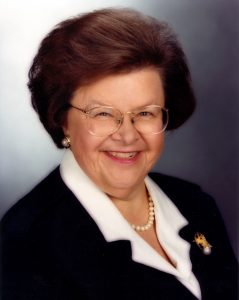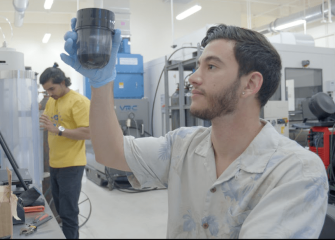
MIKULSKI CALLS ON SENATE TO PASS BIPARTISAN REAUTHORIZATION OF CHILD CARE AND DEVELOPMENT BLOCK GRANT TO HELP AMERICAN FAMILIES ACCESS SAFE, AFFORDABLE CHILD CARE THEY CAN COUNT ON
Senator introduced bipartisan legislation to support CCDBG which serves more than 1.5 million children every month, including 19,000 in Maryland
U.S. Senator Barbara A. Mikulski (D-Md.), a senior member of the Senate Health, Education, Labor and Pensions (HELP) Committee, urged Senate passage of the Child Care and Development Block Grant (CCDBG) Act of 2014, a bipartisan bill that will improve the quality of child care for the more than 1.5 million children and families, including 19,000 in Maryland, who benefit from the federal child care subsidy program. The law has not been reauthorized since 1996. The Senate is considering the legislation on the Floor this week.
“Every working parent with children – no matter their wallet size and no matter their zip code – worries about child care. What’s affordable? What’s accessible? Will my child be safe? What will help prepare my child for school and give them the greatest chance to succeed?” Senator Mikulski said. “This legislation to refresh and reform the Child Care and Development Block Grant is the result of two years of bipartisan cooperation where we are working to change the tone and change the tide to make real change. Updating this vitally important child care program will help support those who care for our children, give parents peace of mind that their children are safe and receiving quality care, and better prepare our children for the future. It will help keep working parents at work while ensuring children have a safe environment that provides them the skills they need to begin to develop their potential and be better prepared for school.”
“As a dad, I understand that it is always difficult to balance work and family. But for many families, especially single parent households, having access to affordable child care is the only way they can work and not be dependent on welfare. The Child Care Development Block Grant (CCDBG) is an important federal program that splits the cost of child care with working families to make sure that affordable, quality options exist for them,” said Senator Burr. “CCDBG is a welfare reform success story that encourages personal responsibility. The transparency we incorporate in this law will go a long way toward making parents well-informed consumers of child care and improve the safety of the programs. It is of particular importance to me that federal dollars will no longer go to child care providers who have been convicted of violent crimes. CCDBG also places an emphasis on improving the quality of our childcare facilities over the next several years. This is not another Washington entitlement but an investment in the self-sufficiency of some of our hardest working families.”
Senator Mikulski introduced the legislation in 2013 along with Senator Richard Burr (R-N.C.), which is cosponsored by Senators Tom Harkin (D-Iowa) and Lamar Alexander (R-Tenn.). Senators Mikulski and Burrare the former chairman and ranking member of the Senate Health, Education, Labor, and Pensions (HELP) Subcommittee on Children and Families, while Senators Harkin and Alexander are chairman and ranking member of the full Committee. The legislation, which was unanimously approved by the Committee in September 2013, represents the 17th bipartisan HELP Committee bill in the 113th Congress to be considered by the full Senate. Ten of those bills have already been signed into law.
When the CCDBG program was last reauthorized in 1996, the program rightly focused primarily on workforce aid. But in the intervening years, more has been learned about the necessity of not just providing children with a place to go, but also the importance of providing them with high-quality care. Last Congress, Senators Mikulski and Burr held three public hearings—consulting with parents, childcare providers and early learning and developmental experts and other child care advocacy organizations—to explore how best the CCDBG program could be reauthorized and improved.
The CCDBG reauthorization bill incorporates feedback and suggestions provided to the Committee since 2012. The bill requires states to devote more of their funding to quality initiatives, such as: training, professional development, and professional advancement of the child care workforce. The bill ensures that CCDBG providers meet certain health and safety requirements related to prevention and control of infectious diseases, first aid and CPR, child abuse prevention, administration of medication, prevention of and response to emergencies due to food allergies, prevention of sudden infant death syndrome and shaken baby syndrome, building and physical premises safety, and emergency response planning. The legislation gives families more stability in the CCDBG program and works to improve early childhood care also by requiring states to focus on infant and toddler quality initiatives. Finally, the bill requires mandatory background checks for child care providers in the CCDBG program.
“Child care is a consideration for all working families—and every parent wants to know that they can entrust their son or daughter to affordable, capable childcare that doesn’t sacrifice on quality or safety,” Senator Harkin said. “This bipartisan bill will not only enhance quality and safety, but will also ensure that low-income and at-risk children and families have access to affordable care, promote the healthy development of children enrolled, and improve services for children with disabilities who require care—improvements that all reflect our greater understanding of what makes a successful child care program. I am encouraged by the HELP Committee’s growing record of bipartisan accomplishments, and this bill is a testament to how Congress can enact meaningful change by working together across party lines.”
“Each year, the Child Care Development Block Grant program helps more than 1.5 million low-income children nationwide, including 39,000 in Tennessee, have the kind of early learning and care that can help put them on the same starting line as other children,” Senator Alexander said. “The program works because it supports parents going to work or getting an education, and gives them the freedom to choose the child care that is right for their family. With this reauthorization, which passed our committee unanimously, Senators Burr and Mikulski have given us a model for getting results in the Senate.”
The bipartisan bill is supported by Afterschool Alliance, American Federation of State, County, & Municipal Employees (AFSME), American Federation of Teachers (AFT), Catholic Charities USA, Child Care Aware, Children’s Defense Fund, Easter Seals, First Focus, MomsRising, National Association for the Education of Young Children, National Child Abuse Coalition, National PTA, National Women’s Law Center (NWLC), Stand for Children, Teach for America, United Way Worldwide and Zero to Three, among many others.
A summary of the bill can be seen here.





